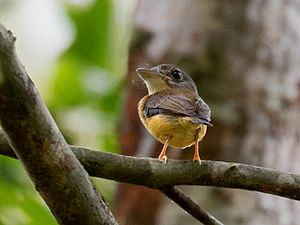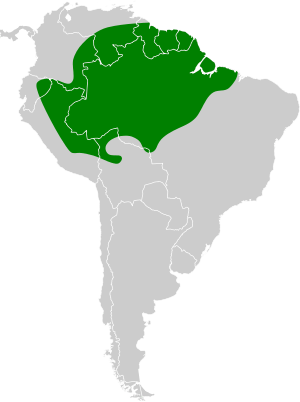White-crested spadebill facts for kids
Quick facts for kids White-crested spadebill |
|
|---|---|
 |
|
| Conservation status | |
| Scientific classification |
|
| Kingdom: | Animalia |
| Phylum: | Chordata |
| Class: | Aves |
| Order: | Passeriformes |
| Family: | Tyrannidae |
| Genus: | Platyrinchus |
| Species: |
P. platyrhynchos
|
| Binomial name | |
| Platyrinchus platyrhynchos (Gmelin, JF, 1788)
|
|
 |
|
| Script error: The function "autoWithCaption" does not exist. | |
Script error: No such module "Check for conflicting parameters".
The white-crested spadebill (Platyrinchus platyrhynchos) is a small, interesting bird found in the warm, wet forests of South America. It's part of the passerine group, which includes most songbirds. This bird belongs to the tyrant flycatcher family, known for catching insects while flying.
You can find the white-crested spadebill in countries like Bolivia, Brazil, Colombia, Ecuador, French Guiana, Guyana, Peru, Suriname, and Venezuela. It prefers to live in moist lowland forests in tropical or subtropical areas. The bird gets its name from its unique, wide bill and a small white patch on its head. It is currently listed as a species of "Least Concern" by the IUCN, meaning it is not in danger of extinction right now.
Contents
About the White-crested Spadebill
The white-crested spadebill is known for its distinctive appearance. It has a very wide, flat bill, which helps it catch insects. Its name, "spadebill," comes from this shovel-like bill. The "white-crested" part refers to a small, often hidden, white patch of feathers on top of its head.
These birds are usually found in the lower and middle parts of the forest, often near water. They are quite small and can be hard to spot among the leaves. Like other flycatchers, they often perch quietly and then dart out to grab an insect in mid-air.
Naming and History
The white-crested spadebill was first officially described in 1788. A German scientist named Johann Friedrich Gmelin gave it its scientific name, Todus platyrhynchos. He included it in his updated version of a famous book called Systema Naturae by Carl Linnaeus.
The second part of its scientific name, platyrhynchos, comes from ancient Greek words. Platus means "broad" or "wide," and rhunkhos means "bill" or "beak." So, its name literally means "broad-billed."
Gmelin's description was based on notes and drawings from another German naturalist, Peter Simon Pallas. Pallas had seen the bird in 1769. Later, it was decided that the first place this bird was described from was Suriname.
Today, the white-crested spadebill is one of seven types of spadebills in the genus Platyrinchus. This group was created in 1805 by a French scientist named Anselme Gaëtan Desmarest.
Different Types of White-crested Spadebills
Scientists recognize four slightly different groups, or subspecies, of the white-crested spadebill:
- P. p. platyrhynchos: This group is found from eastern Colombia, through the Guianas (like French Guiana and Guyana), and into northern Brazil.
- P. p. senex: You can find this one in eastern Ecuador, eastern Peru, northern Bolivia, and the very western part of Brazil.
- P. p. nattereri: This subspecies lives in the central southern part of the Amazon rainforest in Brazil.
- P. p. amazonicus: This group is found in the eastern part of the Amazon in Brazil.
See also
 In Spanish: Picoplano crestiblanco para niños
In Spanish: Picoplano crestiblanco para niños
 | May Edward Chinn |
 | Rebecca Cole |
 | Alexa Canady |
 | Dorothy Lavinia Brown |


